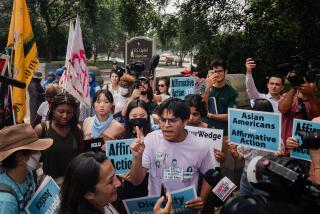Hutchinson, Horowitz on Race
- Share via
Re Perspectives on Race, Commentary, Dec. 18:
In Earl Ofari Hutchinson’s response to David Horowitz, he must have read a different article than the one he responded to. Horowitz never said “lazy,” “stupid” or “lacked initiative and discipline.” What he said was that six of seven children will be poor if they live with a single mother, regardless of race. The lack of a two-parent family is at a very high percentage in the black American community. School performance is abysmal, resulting in low test scores and low skill levels, higher unemployment and obviously less opportunity at the college level.
Black neighborhoods are too violent to encourage businesses in the inner city. Hutchinson states that more crimes are committed by whites, but fails to acknowledge the amount of crimes committed by blacks as their proportional percentage of the population, resulting in a high rate of incarceration.
Is it possible that the economic status of black America could begin with the problems Hutchinson didn’t respond to?
BLAIR W. CAPEK
Arcadia
* This pairing implies that an equal footing was given to two thinkers on this question, but in fact Hutchinson is responding to details in Horowitz’s article and not vice versa. Hutchinson had the advantage of reading Horowitz’s article before he wrote his. This is blatantly unfair.
RICK J. PENNER
Silverlake
* Horowitz’s racist comment that “blacks are underrepresented at elite universities because their test scores are abysmal” begs a number of questions. Perhaps the nearest and most recent one is raised by the news that Compton has been forced by a lawsuit brought by the ACLU (Dec. 17) to actually equip its public schools with toilet paper, clean and safe places to use it, buildings which actually shelter and even textbooks!
Will such luxuries help the children of Compton improve their test scores, Mr. Horowitz, so they may then attend “elite universities”? (Aren’t the UCs and CSUs and community colleges acceptable as a start?) I am sure you have all the answers.
RONALD C. DiCOSTANZO
Santa Monica
* Horowitz basically argues that the reason for the wide racial disparities stems from an inherent moral and social deficiency existing in blacks themselves. I am outraged. Horowitz refuses to acknowledge the potency of institutional racism in this country’s history. Racial zoning, restrictive covenants and FHA redlining under the New Deal were only some of the mechanisms that worked in sequestering minority groups, and especially blacks, into impoverished racial enclaves split by railroads and highways.
I would like Horowitz to consider, if only for a minute, what life would mean for him if his life chances were so severely limited and predetermined by others. In dealing with the problems of today, we cannot hope to come to a real solution, or even make blanket statements such as Horowitz’s, if we choose to ignore all past history, ugly as it is.
CHARA MATSUO
Los Angeles
* Horowitz did an excellent job of summarizing the viewpoints that were excluded from President Clinton’s summit on race relations. These issues need to be talked about openly by people of all races. As long as blacks ignore their serious social problems, they will remain unwelcome in many neighborhoods. This is only human. Nobody wants a junkie or a violent criminal as a neighbor!
JENNIFER MARKS
Irvine
* As debate has focused on whether a history of racism against African Americans justifies affirmative action for the benefit of African Americans, nonwhite immigrants and children of immigrants appear to have been given a free ride in having to justify why they should be given preferential treatment over whites.
My parents voluntarily emigrated here from Central America, without any expectation that they should be given preferential treatment over Americans with much deeper roots in the U.S. When, for example, Italians and the Irish emigrated here, they were the subject of bigotry, yet succeeded without the benefit of any affirmative action. Yet we are now telling their descendants that someone like me, with no family history of being persecuted in this country, has a “civil right” to be preferred in employment and college admissions over them. What logical or moral sense does that make?
RONALD A. MORALES
West Covina
More to Read
Get the L.A. Times Politics newsletter
Deeply reported insights into legislation, politics and policy from Sacramento, Washington and beyond. In your inbox twice per week.
You may occasionally receive promotional content from the Los Angeles Times.










